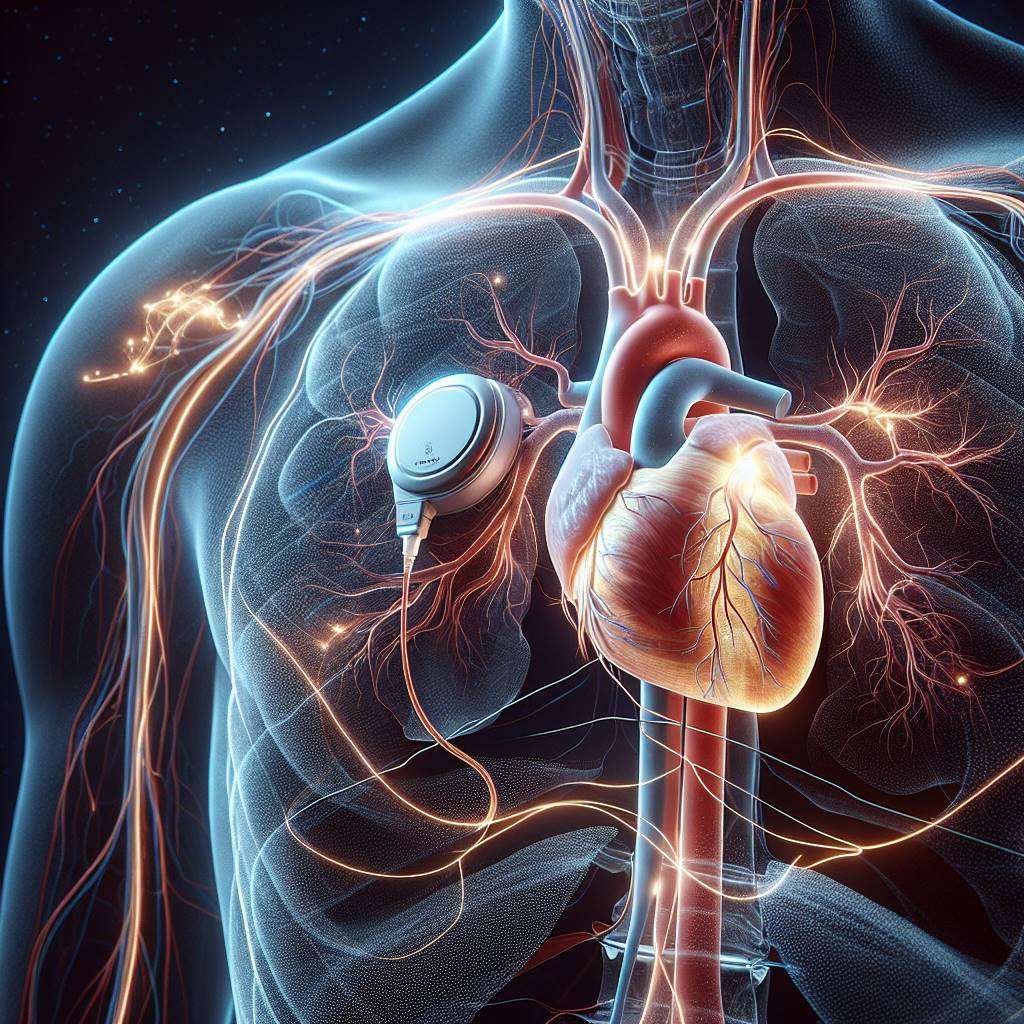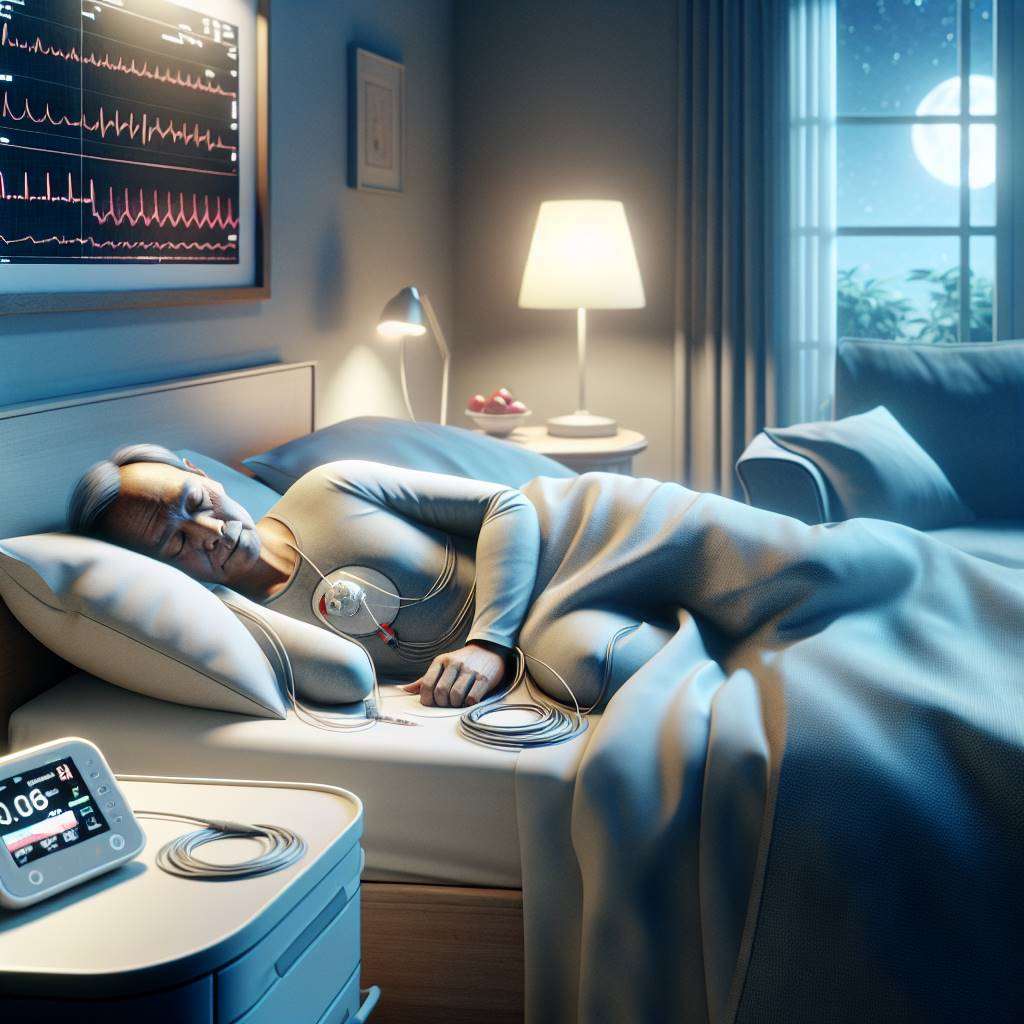Pacemakers play a crucial role in managing heart rhythm disorders, but their impact extends beyond cardiac health. For patients with arrhythmias, a pacemaker can significantly improve sleep quality by stabilizing heart function during rest. Understanding how pacemakers influence sleep is essential for both patients and healthcare providers to ensure optimal outcomes.
Medical disclaimer: This content is for general awareness and does not replace a doctor’s consultation. For diagnosis or treatment decisions, consult a qualified specialist.
Sleep disorders, including sleep apnea, are common in individuals with heart conditions. Pacemakers not only regulate heart rhythms but may also assist in managing certain types of sleep apnea. Raising awareness about this connection can help patients seek timely treatment and improve their overall quality of life.
How Pacemakers Improve Sleep Quality in Heart Patients
Pacemakers are designed to regulate abnormal heart rhythms, ensuring a steady and consistent heartbeat. This regulation is particularly important during sleep, as irregular heartbeats can disrupt the body's natural rest cycles. By maintaining a stable heart rate, pacemakers help patients achieve deeper and more restorative sleep.
Many heart patients experience nocturnal arrhythmias, which can lead to frequent awakenings and poor sleep quality. Pacemakers address this issue by detecting and correcting these irregularities in real time. This not only improves sleep but also reduces the risk of complications like fatigue and daytime drowsiness.
Additionally, pacemakers can alleviate symptoms of conditions like bradycardia (slow heart rate), which often worsens during sleep. By ensuring proper heart function, these devices contribute to better overall health and well-being.

Can Pacemakers Help Manage Sleep Apnea Effectively?
Sleep apnea, particularly central sleep apnea (CSA), is often linked to heart conditions. Pacemakers equipped with advanced features can help manage CSA by improving the coordination between heart and respiratory functions. This is especially beneficial for patients with heart failure, where CSA is more prevalent.
Some modern pacemakers include algorithms that monitor breathing patterns and adjust heart rhythms accordingly. This can reduce the frequency and severity of apnea episodes, leading to better oxygenation and improved sleep quality. While pacemakers are not a primary treatment for obstructive sleep apnea (OSA), they can complement other therapies like CPAP machines.
Patients with both heart conditions and sleep apnea should consult their healthcare provider to determine if a pacemaker could be part of their treatment plan. Combining therapies can lead to more effective management of both conditions.
Understanding the Link Between Pacemakers and Sleep Disorders
The relationship between sleep disorders and heart health is complex. Conditions like insomnia and sleep apnea are more common in individuals with cardiac issues, and untreated sleep disorders can exacerbate heart problems. Pacemakers play a dual role by addressing both heart rhythm abnormalities and their impact on sleep.
Research shows that patients with pacemakers often report improved sleep patterns, reduced nighttime awakenings, and better overall rest. This is because pacemakers help stabilize the physiological processes that are disrupted by heart conditions. For example, they can prevent episodes of atrial fibrillation that might otherwise disturb sleep.
However, it is essential to monitor patients for any new or worsening sleep issues after pacemaker implantation. Regular follow-ups and sleep studies can help identify and address potential complications early.
Do Pacemakers Affect REM Sleep and Restfulness?
REM sleep, the stage of sleep associated with dreaming and cognitive restoration, is crucial for overall health. Heart rhythm irregularities can disrupt REM sleep, leading to poor rest and decreased daytime functioning. Pacemakers help by ensuring a stable heart rate, which supports the body's ability to enter and maintain REM sleep.
Studies suggest that patients with pacemakers experience fewer disruptions during REM sleep compared to those without. This is particularly important for individuals with heart failure, as poor REM sleep can worsen their condition. By improving sleep quality, pacemakers contribute to better energy levels and mental clarity.
It is important for patients to discuss any concerns about sleep disturbances with their doctor. Adjustments to pacemaker settings or additional therapies may be recommended to optimize both heart health and sleep quality.
Pacemakers and Sleep Apnea: What Patients Should Know
For patients with both heart conditions and sleep apnea, understanding the role of pacemakers is vital. While pacemakers are not a standalone treatment for sleep apnea, they can significantly improve outcomes when used alongside other therapies. For example, they can help regulate breathing patterns in central sleep apnea, reducing the severity of symptoms.
Patients should be aware of the potential benefits and limitations of pacemakers in managing sleep apnea. Here is a quick comparison:
| Aspect |
Pacemaker Benefits |
Limitations |
| Heart Rhythm Regulation |
Improves stability during sleep |
Not a cure for all sleep issues |
| Sleep Apnea Management |
Helps with central sleep apnea |
Less effective for obstructive sleep apnea |
Regular follow-ups with a cardiologist and sleep specialist are essential for patients with pacemakers. This ensures that both heart health and sleep quality are effectively managed.
How Pacemakers Regulate Heart Rhythm During Sleep
Pacemakers play a crucial role in maintaining a stable heart rhythm, especially during sleep. For individuals with conditions like bradycardia (slow heart rate), pacemakers ensure that the heart continues to beat at a healthy rate even during the body's resting phase. This is particularly important because the heart rate naturally slows down during sleep, and for some patients, this can lead to dangerously low levels.
Modern pacemakers are equipped with advanced sensors that can detect changes in the body’s activity levels. During sleep, these devices adjust the pacing to mimic the natural rhythm of the heart. This not only improves overall cardiac function but also enhances the quality of sleep by preventing disruptions caused by irregular heartbeats.

Are Pacemakers a Solution for Sleep Apnea Symptoms?
While pacemakers are primarily designed to manage heart rhythm disorders, they can indirectly help with certain sleep apnea symptoms. Sleep apnea, particularly the central type, is often linked to irregularities in the brain's control of breathing and heart rate. In such cases, a pacemaker may stabilize the heart rhythm, which can reduce the severity of apnea episodes.
However, pacemakers are not a direct treatment for obstructive sleep apnea (OSA), which is caused by physical blockages in the airway. Patients with OSA may still require treatments like Continuous Positive Airway Pressure (CPAP) therapy. It is essential to consult a healthcare provider to determine whether a pacemaker is appropriate for managing sleep apnea symptoms in conjunction with other therapies.
Impact of Pacemakers on Sleep Apnea Treatment Outcomes
Studies have shown that pacemakers can improve the outcomes of sleep apnea treatment in certain cases. For patients with central sleep apnea, pacemakers equipped with advanced algorithms can help regulate both heart rate and breathing patterns. This dual regulation can lead to fewer apnea episodes and better oxygen levels during sleep.
However, the impact of pacemakers on obstructive sleep apnea is less direct. While they may improve overall cardiovascular health, additional treatments like CPAP or lifestyle changes are often necessary. Patients should work closely with their doctors to create a comprehensive treatment plan that addresses both heart and sleep health.
| Condition |
Pacemaker Effectiveness |
| Central Sleep Apnea |
Highly Effective |
| Obstructive Sleep Apnea |
Limited Effectiveness |
Can Pacemakers Reduce Snoring and Sleep Interruptions?
Snoring and frequent sleep interruptions are common symptoms of sleep apnea. While pacemakers are not designed to directly address snoring, they can help reduce sleep interruptions caused by irregular heart rhythms. By stabilizing the heart rate, pacemakers may indirectly improve sleep quality for some patients.
It is important to note that snoring is often caused by airway blockages rather than heart issues. For patients with obstructive sleep apnea, treatments like CPAP, weight management, or surgery may be more effective in reducing snoring. Pacemakers are most beneficial for individuals whose sleep disturbances are linked to cardiac arrhythmias.
Sleep Apnea and Pacemakers: Myths vs. Facts
There are several misconceptions about the relationship between pacemakers and sleep apnea. One common myth is that pacemakers can cure all types of sleep apnea. In reality, pacemakers are primarily effective for managing central sleep apnea, not obstructive sleep apnea. Another myth is that pacemakers eliminate the need for other treatments like CPAP, which is not true for most patients.
On the other hand, it is a fact that pacemakers can improve overall cardiac health, which may indirectly benefit sleep quality. Patients should rely on evidence-based information and consult their doctors to separate myths from facts. A combination of treatments is often the best approach for managing both heart and sleep conditions.
- Myth: Pacemakers cure all sleep apnea types.
- Fact: Pacemakers are effective for central sleep apnea.
- Myth: Pacemakers replace CPAP therapy.
- Fact: CPAP is still essential for obstructive sleep apnea.
How Pacemakers Support Better Sleep for Cardiac Patients
Pacemakers play a crucial role in improving the quality of life for individuals with heart rhythm disorders. By regulating the heart's electrical activity, they help maintain a steady heartbeat, which is essential for achieving deep, restorative sleep.
Many cardiac patients experience disrupted sleep due to irregular heart rhythms or conditions like bradycardia. A pacemaker ensures that the heart maintains a consistent rhythm, reducing nighttime awakenings and improving overall sleep quality. This is particularly beneficial for patients who suffer from fatigue caused by poor sleep.
Additionally, a well-functioning pacemaker can alleviate symptoms of nocturnal palpitations, allowing patients to feel more relaxed and comfortable during the night. For cardiac patients, better sleep translates to improved daytime energy and overall well-being.

Do Pacemakers Improve Breathing Patterns During Sleep?
Pacemakers can indirectly improve breathing patterns during sleep, especially for individuals with conditions like sleep apnea. Sleep apnea often coexists with heart rhythm disorders, and treating one can positively impact the other.
By stabilizing the heart rate, pacemakers help reduce the frequency of apneic episodes, where breathing temporarily stops during sleep. This is particularly true for patients with central sleep apnea, a condition linked to heart failure or other cardiac issues. A steady heart rhythm ensures better oxygen flow, which can enhance overall respiratory function.
While pacemakers are not a direct treatment for sleep apnea, they can complement other therapies like CPAP (Continuous Positive Airway Pressure) machines. Patients should consult their doctor to determine the best approach for managing both heart and breathing issues.
Managing Sleep Apnea with Pacemakers: A Comprehensive Guide
Managing sleep apnea alongside a pacemaker requires a multi-faceted approach. While pacemakers help regulate heart rhythms, additional treatments are often necessary to address the root causes of sleep apnea.
For obstructive sleep apnea, lifestyle changes like weight management, avoiding alcohol before bedtime, and using a CPAP machine are highly effective. In contrast, central sleep apnea, which is more common in cardiac patients, may benefit from advanced pacemaker technologies designed to synchronize heart and respiratory functions.
| Condition |
Recommended Treatment |
| Obstructive Sleep Apnea |
CPAP, lifestyle changes |
| Central Sleep Apnea |
Pacemaker, oxygen therapy |
Patients should work closely with their healthcare team to create a personalized treatment plan that addresses both cardiac and respiratory health.
Pacemakers and Sleep: Tips for a Restful Night
Sleeping with a pacemaker may require some adjustments to ensure comfort and safety. Here are some tips to help you achieve a restful night:
- Sleep on your back or the opposite side of the pacemaker to avoid pressure on the device.
- Avoid using electric blankets or heating pads near the pacemaker, as they may interfere with its function.
- Maintain a consistent sleep schedule to support your body's natural rhythms.
- Discuss any sleep disturbances with your doctor, as they may indicate a need for device adjustments.
By following these tips, patients can minimize discomfort and enjoy better sleep quality while living with a pacemaker.
What to Expect When Sleeping with a Pacemaker
Sleeping with a pacemaker is generally safe and comfortable, but it’s natural to have concerns, especially in the initial weeks after implantation. Most patients adapt quickly and experience minimal disruption to their sleep routines.
During the recovery period, it’s important to avoid sleeping on the side where the pacemaker is implanted to prevent discomfort or device displacement. Over time, the body adjusts, and patients can resume their preferred sleeping positions.
If you notice unusual symptoms like dizziness, fatigue, or irregular heartbeats during the night, consult your doctor immediately. These could indicate a need for pacemaker reprogramming or further evaluation.
With proper care and monitoring, most patients find that their pacemaker enhances their overall sleep quality and nighttime comfort.
Best Pacemaker Surgery Doctors in India
Dr. Balbir Singh, a renowned cardiologist at Medanta - The Medicity, Gurugram, has over 30 years of experience in electrophysiology and pacemaker implantation. Another expert is Dr. Praveen Chandra, Chairman of Interventional Cardiology at Medanta - The Medicity, Gurugram, with 25+ years of experience and international recognition for his expertise in cardiac care.
Learn more on best pacemaker implantation surgery doctors in india
Best Pacemaker Surgery Hospitals in India
Fortis Escorts Heart Institute, New Delhi, a JCI-accredited hospital, is known for advanced cardiac care and pacemaker implantation. Apollo Hospitals, Chennai, NABH-accredited, offers cutting-edge technology and multidisciplinary care for international patients. Both hospitals are equipped with state-of-the-art facilities and have a track record of successful outcomes in cardiac treatments.
Find more best pacemaker implantation surgery hospitals in india
Pacemaker Surgery Cost in India
The cost of pacemaker implantation in India typically ranges from INR 2,50,000 to INR 5,00,000 (approximately USD 3,000 to USD 6,000). Factors influencing the cost include the type of pacemaker, the hospital's category, and the doctor's expertise. The average hospital stay is 2-3 days. India offers a significant cost advantage compared to Western countries, with options for medical insurance and third-party financing.
Learn pacemaker implantation surgery cost in india
Pacemaker Surgery Treatment in India
Pacemaker implantation in India involves a minimally invasive procedure where the device is placed under the skin near the chest. Advanced technologies like 3D mapping and robotic-assisted techniques are used in leading hospitals. Recovery typically takes 1-2 weeks. Indian hospitals adhere to global medical protocols and offer innovative approaches to ensure patient safety and comfort.
Learn on Pacemaker Surgery Treatment in India
FAQs
Can a pacemaker improve sleep quality?
Yes, a pacemaker can improve sleep quality by regulating heart rhythms, which may reduce symptoms like fatigue and restlessness caused by arrhythmias.
Is it safe to sleep on the side with a pacemaker?
Yes, it is generally safe to sleep on the side with a pacemaker. However, patients should avoid pressure on the implantation site during the initial recovery period.
Can a pacemaker help manage sleep apnea?
While a pacemaker is not a primary treatment for sleep apnea, certain devices like cardiac resynchronization therapy (CRT) pacemakers may indirectly improve breathing patterns in patients with heart failure.
What precautions should I take while sleeping with a pacemaker?
Patients should avoid sleeping positions that put pressure on the pacemaker site and ensure their sleeping environment is free from devices that may cause electromagnetic interference.
Can pacemakers interfere with CPAP machines?
No, CPAP machines used for treating sleep apnea do not interfere with pacemaker function. Patients can safely use both devices.
How soon can I resume normal sleep after pacemaker implantation?
Most patients can resume normal sleep within 1-2 weeks after pacemaker implantation, depending on their recovery and doctor's advice.
Do pacemakers have alarms that might disrupt sleep?
No, modern pacemakers do not have audible alarms that disrupt sleep. Any alerts are typically communicated during follow-up checks.
Can a pacemaker detect sleep apnea?
Some advanced pacemakers have sensors that can detect breathing irregularities, which may indicate sleep apnea. Consult your doctor for specific device features.
Are there specific pacemakers designed for sleep apnea patients?
Yes, certain cardiac devices like phrenic nerve stimulators are designed to address central sleep apnea. Discuss with your cardiologist for suitable options.
Can pacemakers cause insomnia?
Insomnia is not a common side effect of pacemakers. However, anxiety or discomfort post-surgery may temporarily affect sleep. Consult your doctor if symptoms persist.
Understanding Pacemakers: Myths, Facts, and Considerations for the Elderly
Pacemakers have become a vital solution for individuals with heart rhythm disorders, but many still harbor misconceptions about living with one. In the blog post Can You Live a Normal Life With a Pacemaker? Myths vs. Facts, readers can explore common myths and the realities of daily life after receiving a pacemaker. This resource helps demystify the experience, ensuring patients feel empowered and informed.
Particularly for elderly patients, the decision to get a pacemaker can come with unique benefits and concerns. The article Pacemakers in Elderly Patients: Benefits and Concerns delves into how these devices can enhance quality of life while also addressing potential risks that older adults may face. Understanding these factors is crucial for both patients and caregivers.
In conclusion, educating oneself about pacemakers can significantly impact the overall experience and health outcomes for individuals, especially the elderly. By dispelling myths and recognizing the benefits, patients can navigate their heart health journey with confidence.